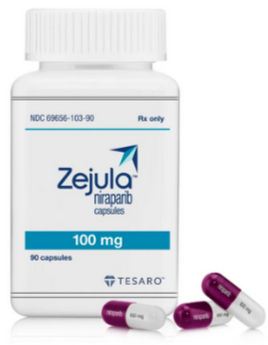Niraparib nearly doubles progression-free survival in prostate cancer with specific genetic mutations
- Michael O'Leary

- 28 minutes ago
- 3 min read

CANCER DIGEST – Nov. 9, 2025 – Men with prostate cancer whose tumors have specific genetic mutations saw a nearly 50 percent reduction in the risk of their cancer progressing when they received a new drug combination, researchers at the University College of London report.
The early results of the phase three AMPLITUDE trial focused on men with advanced prostate cancer that had spread to other parts of the body and were receiving initial treatment. Led by Professor Gerhardt Attard of the UCL Cancer Institute, the trial involves 676 men from 32 countries with a median age of 68. The results were published in the Oct. 7, 2025 journal Nature Medicine.
All the men had mutations in genes involved in homologous re-combination repair, called HRR genes. These genes and related genes including BRCA1, BRCA2, CHEK2, and PALB2 all play a key role in DNA damage repair. More than half of the men had mutations in BRCA1 or BRCA2. When these genes become mutated in prostate cancer, men experience more aggressive cancer that spreads more rapidly and is more difficult to treat.
In the trial, half the men received standard treatment for advanced prostate cancer that includes hormone blockers and corticosteroids and 20 percent of this group also received a chemotherapy drug called docetaxel. The other half of the participants received that same standard treatment plus a targeted therapy called niraparib.
NIRAPARIB (nye RAP a rib) is a drug that targets specific enzymes within cancer cells and stops the cancer cell from repairing DNA damage. This medicine is FDA-approved for the treatment of ovarian cancer, fallopian tube cancer, and peritoneal cancer.
After a median follow-up of more than two and a half years (30.8 months), the men in the niraparib group had 37 percent lower risk of their cancer progressing, and those with the BRCA1 and 2 mutations had a 48 percent lower risk of cancer progression. In addition, the time before symptoms worsened was twice as long for the naraparib group compared to the standard therapy group. Of those whose symptoms worsened, only 16 percent of those in the niraparib group experienced significant symptom progression compared to 34 percent of those in the standard therapy group.
"Although current standard treatments are very effective for the majority of patients with advanced prostate cancer," Professor Attard said in a press release, "a small but very significant proportion of patients have limited benefit. We now know that prostate cancers with alterations in HRR genes account for a significant group of patients whose disease recurs quickly and has an aggressive course. By combining with niraparib we can delay the cancer returning and hopefully significantly prolonging life expectancy."
Attard added that the findings support the idea of genomic testing at diagnosis to determine which patients may need a more targeted treatment.
Side effects such as anemia, high blood pressure were more common in the naraparib group, and 14 patients in the niraparib group died compared to 7 in the standard treatment group.
The authors noted that while these results are promising for naraparib, more research is needed to determine long-term survival benefits.
Source: University College London press release via ScienceDaily, 21 October 2025.























Comments